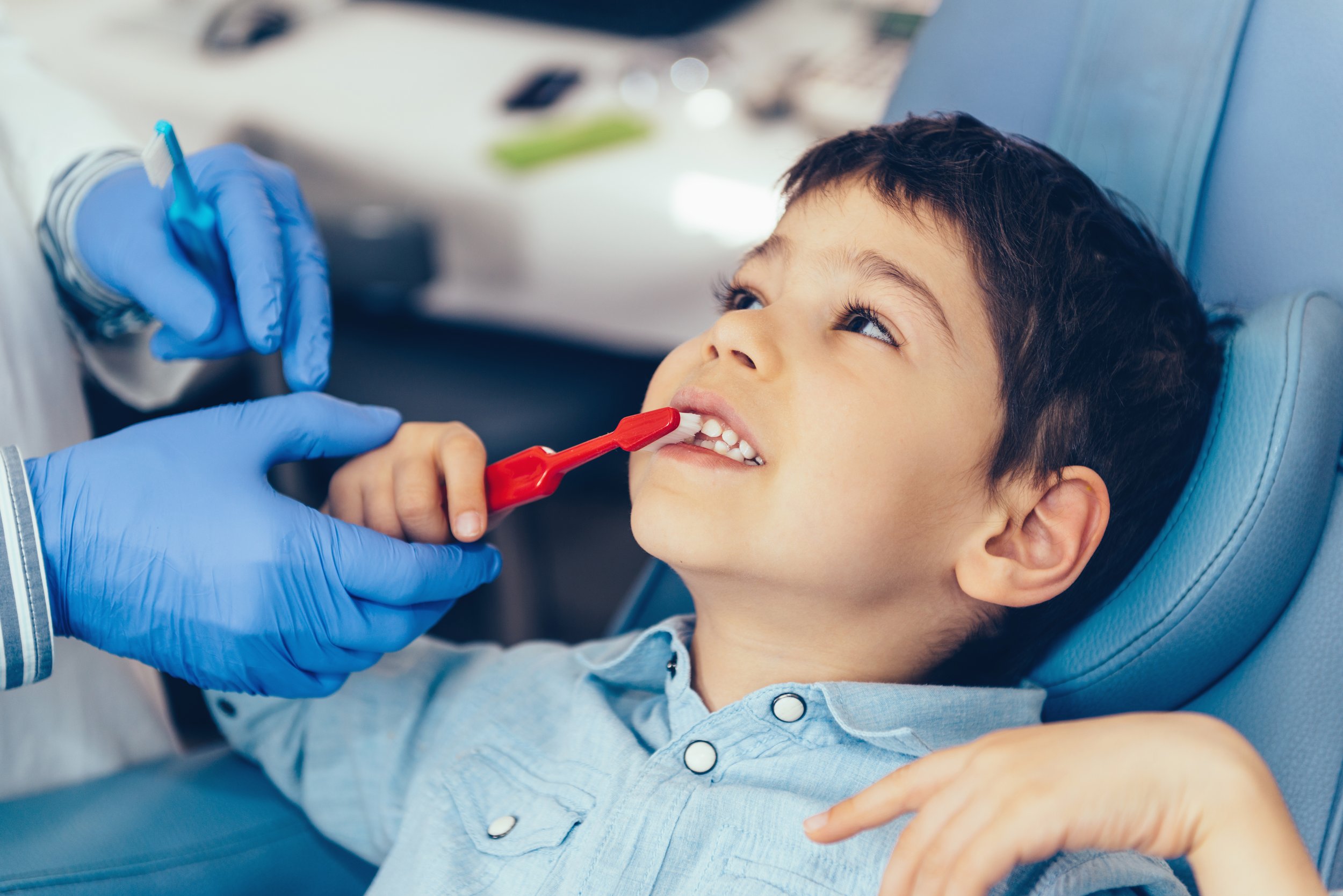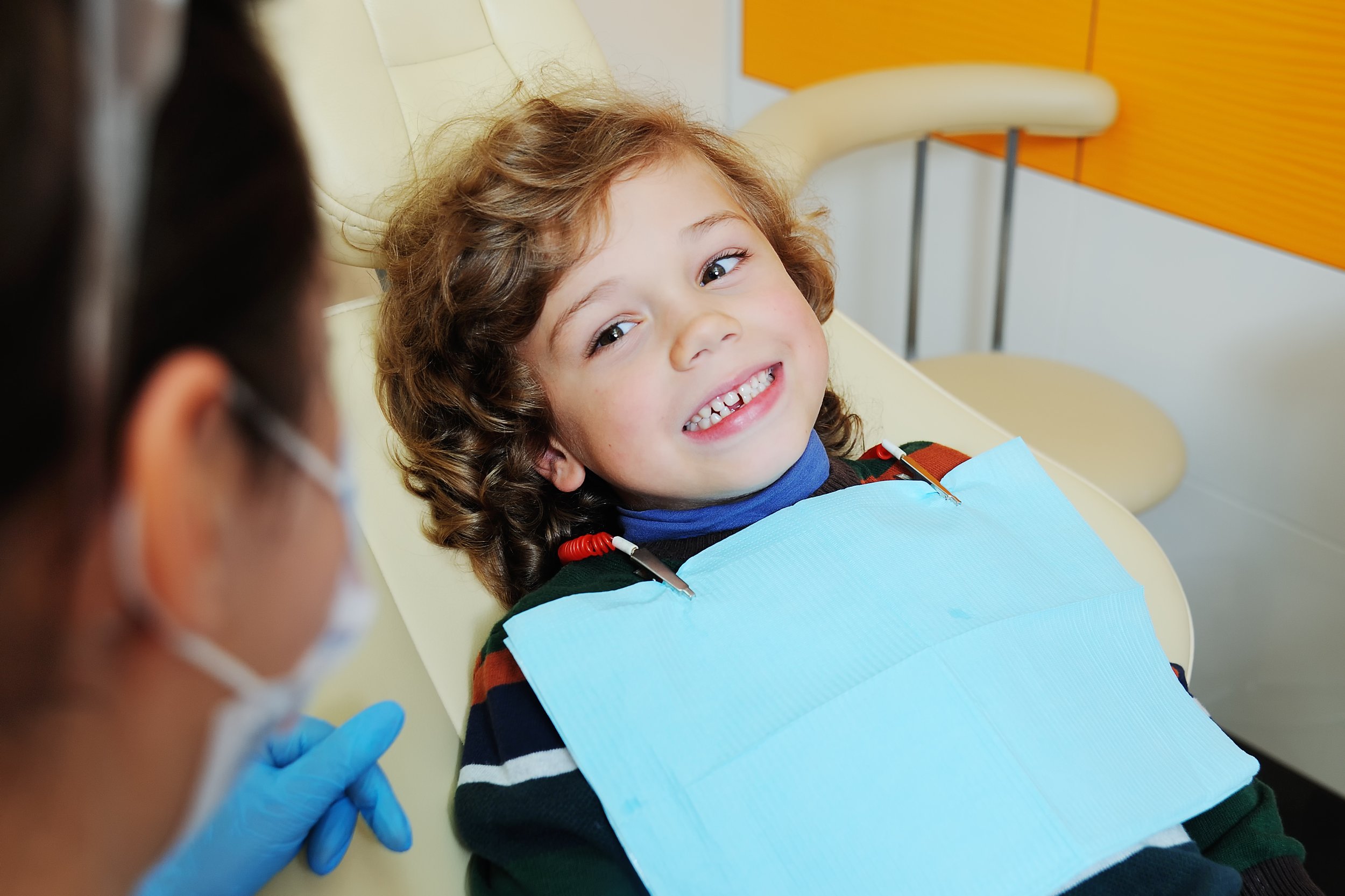
Preventative Dentistry
Preventative Dentistry on the Upper East Side, NYC
The American Academy of Pediatric Dentistry states that preventative care should start by the first birthday or six months after the first tooth erupts. We strive to build a positive relationship from the first visit so your child has a healthy attitude about visiting the dentist. Our preventative treatment plan includes dental cleanings and sealants, fluoride treatments, and the services described below.
Instruction on Oral Hygiene
Bacteria naturally present in your child’s mouth can cause a sticky substance known as plaque to form on your child’s teeth. This happens when food remains on the teeth too long. Plaque contains acid that harms the tooth’s enamel and causes cavities, pain, infection, and possible loss of teeth. We recommend the following to prevent tooth decay:
Avoid putting your baby to sleep with a bottle of milk or juice since this leads to childhood cavities. Water may be okay.
Teach your child how to brush his or her teeth as soon as the first tooth appears.
Assist your child with tooth brushing until around age six and don’t allow children under age two to use toothpaste with fluoride.
The Importance of Good Nutrition
A healthy diet is essential for your child’s development and his or her dental health. Foods containing high amounts of sugar, starch, and carbohydrates produce more bacteria in the mouth than other types of food. We encourage you to limit treats and snacking between meals as both increase the risk of tooth decay.
Thumb-Sucking and Other Oral Habits
Using a pacifier and thumb-sucking are common ways for babies to soothe themselves. Unfortunately, these habits can affect proper tooth alignment when they continue past infancy. You can help your child avoid developing habits that are hard to break by offering comfort and praise when he or she feels anxious. A preventive appliance may be necessary for older children who are struggling to break these habits.
Tongue thrusting is another common habit in children. This means your child moves his or her tongue forward while swallowing food. Since this can lead to orthodontic problems later, we may recommend oral therapy or a night guard to eliminate the habit.
Common Dental Problems
Preventive dental care is a big part of what we do here at Upper East Side Kids Dentist. We want your child to enjoy good oral health, unencumbered by preventable conditions. We do understand, however, that issues such as bad breath, canker sores, gum disease, and tooth decay can still afflict your child. When that happens, we’re here to diagnose and treat the problem as quickly as possible.
Bad Breath
Halitosis, the medical name for bad breath, can affect kids just as easily as adults. It happens when food particles remaining in the mouth break down. While everyone has bad breath occasionally, consistent bad breath could suggest the presence of gum disease or other health conditions. Allergy and sinus issues are some of the more common causes of bad breath in kids.
Canker Sores
You can identify a canker sore by its red border and gray or white color around the base. The best way to prevent a recurrence is to have your child use topical agents or a mouthwash with antimicrobial properties.
Gum Disease
Also called periodontal disease, gum disease can damage bone, cause painful inflammation, and even tooth loss. Children are more likely to develop gingivitis, which is an early form of gum disease, from excess plaque on the teeth. Plaque consists of a sticky film made from bacteria. Bleeding and swollen gums are often the first indication of gum disease. Fortunately, it’s preventable with a daily routine of brushing and flossing.
Tooth Decay
Tooth decay forms from frequent consumption of sugary and starchy foods, which forms acid. This acid can erode tooth enamel. Foods and snacks with a high carbohydrate content, such as candy, cookies, soda, and fruit drinks, cause the most tooth decay in children. Deposits from starches and sugars combine with bacteria to form plaque. This eventually causes damage to the mineral structure of your child’s teeth. Limiting these types of snacks and ensuring your child brushes and flosses daily is the best protection against tooth decay.
Kids Teeth Cleaning
At Upper East Side Kids Dentist, we recommend that children come in for a checkup once every six months. You can schedule the first appointment as early as age one or when your child has had teeth for at least six months. We make visits as pleasant and educational as possible for kids so they learn to make a positive association with visiting the dentist early in life. It has been our experience that early trauma or anxiety can be difficult to overcome.
What to Expect During Your Child’s Cleaning Appointment
We first take the time to gain your child’s trust and cooperation before getting started with the following:
Polishing of teeth: We clean your child’s teeth with polishing cream and special dental instruments to remove stains and plaque that he or she may not be able to clean with regular tooth brushing.
Plaque removal: When food remains on the teeth too long, bacteria invade and turn into plaque. This is a sticky film that coats the teeth and causes inflammation of your child’s gums. If it turns into gum disease, your child can experience infection, tooth loss, and other serious problems.
Tartar removal: Plaque can harden and turn into tartar when it remains on teeth too long. Tartar can appear both above and below your child’s gum line and requires special instruments to remove.
Avoid These Dental Problems with Bi-Annual Preventive Care Appointments
Poor oral hygiene and an unhealthy diet early in life can cause the following problems:
Bad breath
Bone damage
Gum disease
Stained teeth
Tooth decay requiring fillings
Tooth loss
In addition to cleaning your child’s teeth and removing plaque and tartar, our dentists perform an examination to look for signs of problems like oral cancer, gum disease, tooth decay, or issues with alignment. If your child’s dentist spots a problem, the next step is to complete a diagnostic X-ray to confirm a diagnosis. From there, a custom treatment plan is developed and shared with you to confirm your understanding, answer all questions, and address any concerns.
Fluoride Treatments
Fluoride treatments are a regular part of preventive oral healthcare at Upper East Side Kids Dentist.
Dr. Mariya evaluates your child’s cavity risk and other individual factors, then requests your permission, before applying the fluoride treatment. Fluoride is an extremely valuable tool to keep your child’s teeth strong, healthy, and free of cavities.
What is Fluoride and Why Do We Supplement It?
Food such as eggs, fish, and meat contain fluoride, as does drinking water. Some manufacturers also add it to toothpaste and mouthwash. Unfortunately, the amount of fluoride naturally present in food, water, and certain products doesn’t provide your child with an adequate benefit. Teeth that are still developing need extra protection to guard against tooth decay, gum disease, and cavities.
Factors to Consider in Administering a Fluoride Treatment
Certain lifestyle habits and health conditions make some children better candidates for fluoride treatments than others. These include:
Presence of cavities, or cavities in the beginning stages
Defects of tooth enamel
Inadequate oral hygiene habits
Lack of nutritious diet
White spots on teeth after wearing braces
What to Expect When Your Child Receives a Fluoride Treatment
Dr. Mariya uses a type of varnish, foam, or gel that she either paints on your child’s teeth directly, or places in a tray, and then inserts the tray in his or her mouth. Your child should avoid eating or drinking immediately after the procedure so the fluoride doesn’t immediately wash off. She may also send you home with fluoride supplements that your child can take daily if you don’t feel there is enough natural fluoride in your water supply. Another option is to write a prescription for a fluoride gel.
We can provide your child with a fluoride treatment annually, bi-annually, or every three months, at your discretion. Dr. Mariya normally delivers the procedure at your child’s regular preventive care exam, but you may schedule a separate appointment if desired.

Make an Appointment for Your Child’s Smile!
📱 (212) 360-0835




